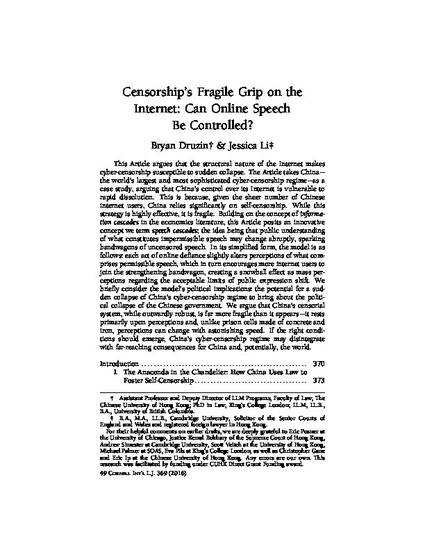
Article
Censorship’s Fragile Grip on the Internet: Can Online Speech Be Controlled?
Cornell International Law Journal
(2016)
Abstract
This Article argues that the structural nature of the Internet makes cyber-censorship susceptible to sudden collapse. The Article takes China— the world’s largest and most sophisticated cyber-censorship regime— as a case study, arguing that China’s control over its Internet is vulnerable to rapid dissolution. This is because, given the sheer number of Chinese internet users, China relies significantly on self-censorship. While this strategy is highly effective, it is fragile. Building on the concept of information cascades in the economics literature, this Article posits an innovative concept we term speech cascades; the idea being that public understanding of what constitutes impermissible speech may change abruptly, sparking bandwagons of uncensored speech. In its simplified form, the model is as follows: each act of online defiance slightly alters perceptions of what comprises permissible speech, which in turn encourages more internet users to join the strengthening bandwagon, creating a snowball effect as mass perceptions regarding the acceptable limits of public expression shift. We briefly consider the model’s political implications: the potential for a sudden collapse of China’s cyber-censorship regime to bring about the political collapse of the Chinese government. We argue that China’s censorial system, while outwardly robust, is far more fragile than it appears— it rests primarily upon perceptions and, unlike prison cells made of concrete and iron, perceptions can change with astonishing speed. If the right conditions should emerge, China’s cyber-censorship regime may disintegrate with far-reaching consequences for China and, potentially, the world.
Keywords
- Internet,
- censorship,
- china,
- behavioral economics
Disciplines
Publication Date
November, 2016
Citation Information
Bryan H. Druzin. "Censorship’s Fragile Grip on the Internet: Can Online Speech Be Controlled?" Cornell International Law Journal (2016) Available at: http://works.bepress.com/bryan_druzin/23/
